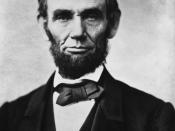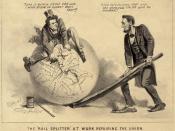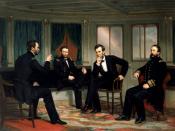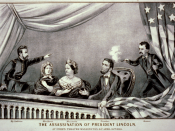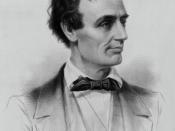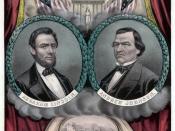Abraham Lincoln was born February 12, 1809, in what is now known as Larue, Kentucky, to Thomas and Nancy Lincoln. Abraham Lincoln's mother died when he was ten years old. He attended primary school with other children his age during that time, but he learned only the basics of a formal education. All of his other education that he achieved was self-taught from necessity. Although Abraham Lincoln was raised on a farm, he only did farm-work until the age of twenty-two. When Abraham Lincoln relocated to Illinois, his interest in politics became his main desire. His venture in the world of politics started with his first campaign for the Illinois state legislature in eight teen thirty two. He lost that campaign for the Illinois state legislature in eight teen thirty two. The campaign for the Illinois state legislature was unsuccessful, but the following three elections that he campaigned were successful.
In eight teen forty six he was elected to the lower house of congress he first national campaign. All of his accomplishments were achieved through Lincoln's determination and work ethic. He was not well-known in Illinois, because he had moved there and did not have any connection in the political community. Abraham Lincoln greatest political victory came when he was elected president of the United States of America. He achieved all of his accomplishments solely by himself with no help. Lincoln was a "self-made man who overcame the poverty and ignorance that handicapped so many Americans" (Johnson, 13). He overcame the death of his mother, the poverty of the farm that he grew up on, and the struggles that go along with success in politics. Lincoln's law partner William H. Herndon called Lincoln's ambition "a little engine that knew no rest" (Johnson, 22). It was this attitude that shaped Lincoln's opinion on slavery. Lincoln strongly opposed slavery, because it was taking place in America, a country that has a "commitment to the ideals of freedom and equality" (Johnson, 52). He also believed that by people owning slaves, they were forcing people to do work that they should be doing their selves. These beliefs made it difficult for Lincoln, when the civil war came about. In his mind, one of the main objectives of the war was to free the slaves, but this was not the goal of many of the soldiers in the Union Army, so he made saving the Union the main objective of the war. However as the war came to an end Lincoln began to question his position on slavery because of his faith in democracy and what he felt it could do for the country. "Lincoln believed that protecting slavery would appeal to loyal unionists within the Confederacy and would cement the loyalty of the border slave states of Maryland, Delaware, Kentucky and Missouri," but then Lincoln, along with his troops realized that this was not the right approach for the war. They discovered that "by protecting slavery they were aiding the enemy, who benefited from slavery" (Johnson, 179). White northerners agreed, and the war began to encourage the end of slavery, which in turn created a new way to defeat the rebellion. Lincoln "firmly believed in the profound social, political, and moral virtues of work" (Johnson, 23). This is another virtue that is part of the reason he was able to achieve the American Dream. This belief is made very evident in several letters that he wrote to his step brother John D. Johnston. Johnston was the complete opposite of Lincoln. He hated to work and would often ask Lincoln for money. At first Lincoln would bilge Johnston and help him, but he got tired of Johnston not doing anything productive with the money so he told him that he would not help him until he got a job and actually helped himself first. Lincoln had immeasurable ambition and he wanted others to know that "ambitions could be realized only through work" (Johnston, 32). Abraham Lincoln worked his hardest at everything that he did. His ascent from long cabin to Congress proved to him that Americans who worked hard could achieve seemingly impossible goals" (Johnson, 30). Achieving the American Dream is a seemingly impossible goal which Lincoln embodied in his life.
